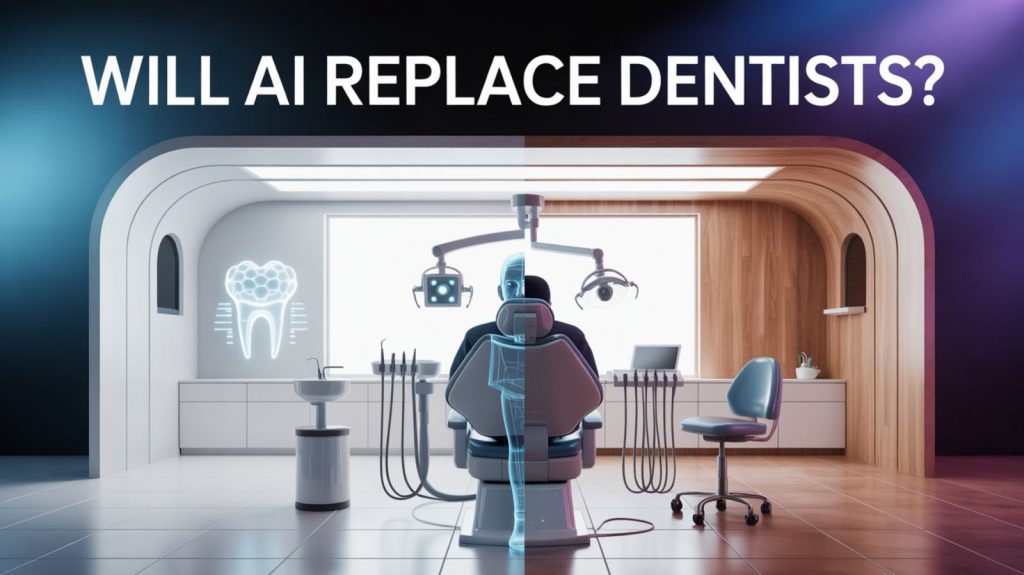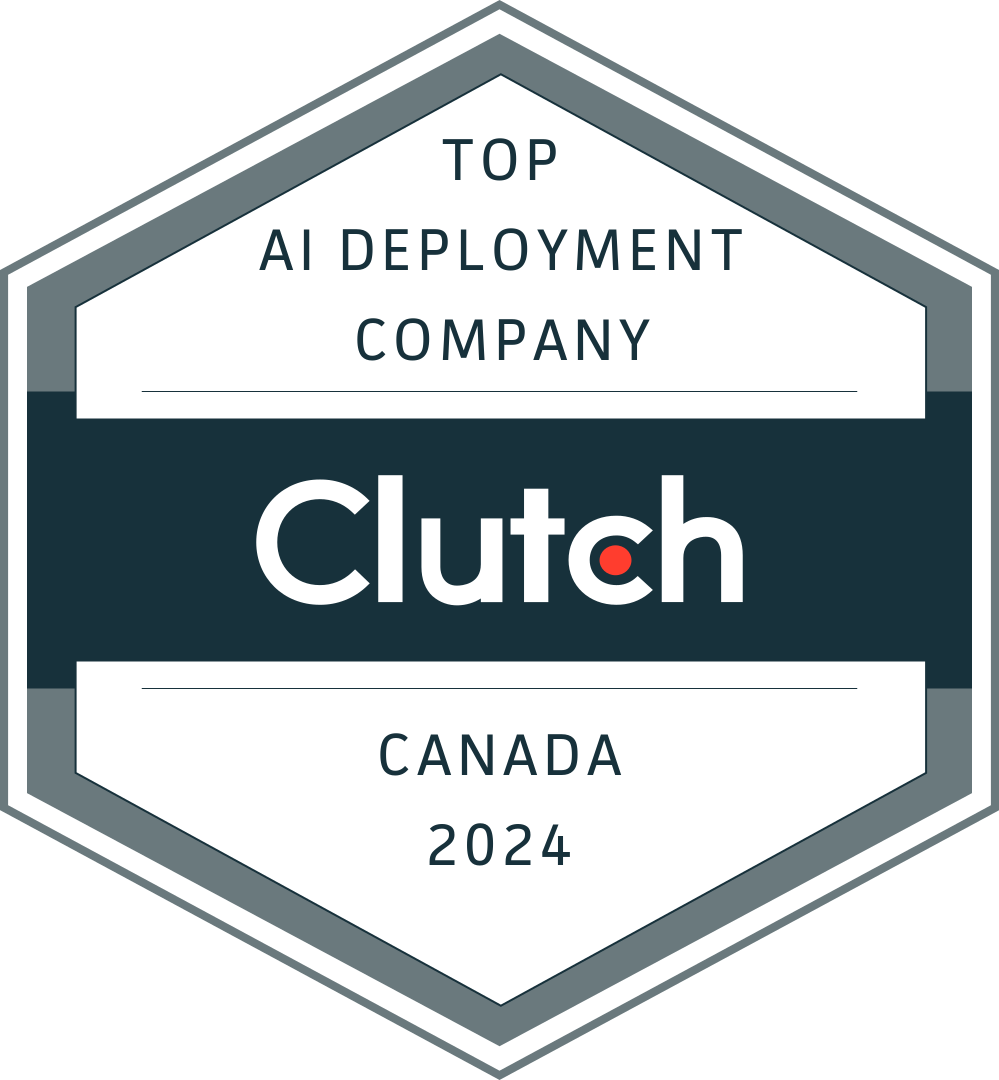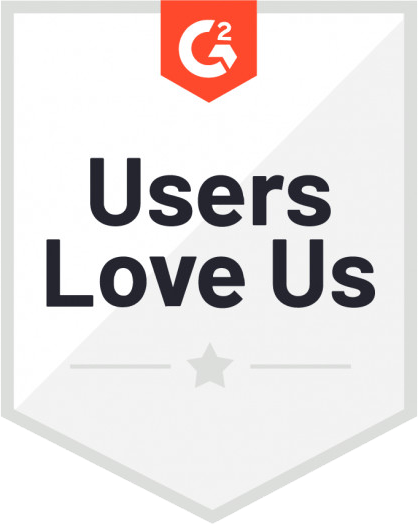
The Complete Guide to Your Dental Career’s Future
AI will not replace dentists but will enhance their capabilities. Current AI helps with diagnostics and administrative tasks, while complex procedures requiring human touch, empathy, and decision-making remain exclusively human. Dentists who embrace AI tools will gain competitive advantages over those who don’t.
The rise of artificial intelligence has dental professionals worldwide asking one critical question: “Will AI replace dentists?” If you’re a dentist, dental student, or someone considering a dental career, this comprehensive guide provides evidence-based answers about AI’s real impact on dentistry.
The definitive answer: AI will not replace dentists. However, AI will fundamentally change how dentists work, making them more accurate, efficient, and effective. This transformation mirrors what’s happening across healthcare, where AI voice automation enhances rather than replaces human professionals.
Will AI Fully Replace Human Dentists in Clinical Practice?
No, AI cannot and will not fully replace human dentists in clinical practice within the foreseeable future.
The dental profession requires a unique combination of manual dexterity, emotional intelligence, clinical judgment, and patient communication that current AI technology cannot replicate. Unlike other industries where AI has successfully replaced human workers, dentistry involves complex human interactions and physical procedures that demand human oversight.
Key Evidence Supporting This Conclusion:
- Dental procedures require precise tactile feedback and manual skills
- Patient anxiety management needs human empathy and communication
- Complex treatment decisions involve ethical and situational factors AI cannot process
- Regulatory requirements mandate human supervision for patient safety
What This Means for Your Career: Dental careers remain secure, but professionals must adapt to work alongside AI tools. The future belongs to dentists who enhance their practice with AI capabilities while maintaining the essential human elements of patient care.
Modern customer service AI demonstrates how technology augments rather than replaces human professionals across healthcare industries.
What Dental Tasks Can AI Currently Automate?
AI currently automates diagnostic imaging analysis, treatment planning assistance, administrative tasks, and patient communication, but cannot perform physical procedures independently.
Diagnostic and Imaging Tasks
AI excels at analyzing large amounts of visual data quickly and consistently. Current applications include:
- X-Ray and Radiograph Analysis: Cavity detection with 85-90% accuracy, bone loss measurement, root canal anatomy mapping, oral cancer screening
- 3D Imaging and CBCT Scans: Implant placement planning, surgical procedure mapping, airway analysis, TMJ disorder assessment
- Intraoral Imaging: Real-time cavity detection, gum disease monitoring, treatment progress documentation
Administrative and Practice Management
- Appointment Management: Automated scheduling, reminder systems reducing no-shows by 40%, waitlist optimization
- Patient Communication: 24/7 AI voice agents handling basic inquiries, treatment explanations, emergency triage
Treatment Planning Assistance
- Risk assessment based on patient history
- Treatment outcome predictions
- Cost-benefit analysis for different procedures
- Preventive care recommendations
Important Limitation: While AI assists with planning, final treatment decisions always require human dentist approval and oversight.
Future Timeline: When Might AI Replace Parts of Dentistry?
Timeline Overview: AI adoption in dentistry follows a gradual progression, with full automation of complex procedures remaining 20-30 years away, if ever achievable.
Enhanced Diagnostic Tools: More accurate imaging analysis software, real-time cavity detection, improved treatment outcome prediction models, better integration with practice management systems.
Limited Replacement: Administrative tasks and basic diagnostic support only.
Advanced Robotic Assistance: Robot-assisted implant placement under dentist supervision, automated dental laboratory work, enhanced surgical planning with AR/VR integration.
Moderate Replacement: Routine laboratory tasks and surgical assistance roles may see automation.
Sophisticated AI Integration: Advanced robotic systems for routine procedures, AI-powered treatment planning with minimal human input, enhanced teledentistry capabilities.
Significant Enhancement: Complex procedures may involve AI assistance, but human oversight remains essential.
Theoretical Advanced Systems: Highly sophisticated robots capable of routine procedures, AI systems with advanced decision-making capabilities.
Reality Check: Even these advanced systems would require human supervision, ethical oversight, and patient consent management.
For practices preparing for this future, AI call management systems offer current solutions that demonstrate how AI enhances rather than replaces human professionals.
Which Areas of Dentistry Are Most Affected by AI?
Summary: Different dental specialties experience varying levels of AI integration, with diagnostic-heavy fields seeing the most immediate impact.
General Dentistry – High AI Impact
Current Applications: Cavity detection in routine X-rays (90% accuracy rates), gum disease progression monitoring, treatment plan optimization, preventive care scheduling.
Why High Impact: General practice involves many routine diagnostic tasks that AI handles well.
Human Elements Remaining: Patient communication, complex treatment decisions, procedural execution, emergency management.
Orthodontics – Very High AI Impact
Current Applications: 3D treatment planning and simulation, progress tracking through photo analysis, appliance design optimization, treatment timeline prediction.
Why Very High Impact: Orthodontics relies heavily on measurement, tracking, and predictable treatment progressions that suit AI capabilities.
Oral and Maxillofacial Surgery – Moderate AI Impact
Current Applications: Surgical planning through 3D imaging, risk assessment for complex procedures, post-operative monitoring protocols, implant placement guidance.
Human Dependence: High – surgical procedures will likely always require direct human control due to safety and liability concerns.
For specialized healthcare communication needs, healthcare call center AI demonstrates how different medical specialties benefit from targeted AI solutions.
Can AI Handle Specific Dental Procedures?
AI cannot currently perform actual dental procedures independently but can assist with planning, monitoring, and post-treatment care.
Dental Cleanings and Hygiene
What AI Can Do: Analyze images to identify plaque buildup, create personalized oral hygiene recommendations, track cleaning effectiveness, schedule maintenance intervals.
What AI Cannot Do: Perform actual scaling and root planing, assess tissue health through touch, adapt technique based on patient comfort, handle medical emergencies.
Future Potential (10+ years): Robotic assistance for routine scaling under human supervision may become possible.
Fillings and Restorative Work
What AI Can Do: Analyze cavity extent through imaging, design optimal restoration shapes, predict material longevity, generate treatment plans with cost estimates.
What AI Cannot Do: Remove decayed tooth structure safely, place and shape filling materials, ensure proper bite adjustment, manage patient pain and comfort.
Human Skills Required: Manual dexterity, tactile feedback, real-time decision making, and patient management remain exclusively human capabilities.
For practices looking to enhance patient communication around procedures, AI voice assistants can explain procedures while maintaining human oversight for clinical decisions.
Difference Between Automating Dental Tasks vs. Full Dentist Replacement
Key Distinction: Task automation enhances dentist capabilities, while full replacement would eliminate the need for human dentists entirely – a scenario that won’t occur.
Task Automation (Currently Happening)
Definition: AI handles specific, well-defined activities while dentists maintain control over patient care and clinical decisions.
- Administrative Tasks: Appointment scheduling, insurance verification, billing processes
- Diagnostic Support: X-ray analysis, cavity detection, treatment planning assistance
- Patient Communication: Basic questions, appointment reminders, post-care instructions
- Documentation: Automated note-taking, treatment tracking, progress reports
Benefits for Dentists: More time for direct patient care, reduced administrative burden, enhanced diagnostic accuracy, improved practice efficiency.
Full Dentist Replacement (Not Feasible)
Why This Won’t Happen:
- Legal and Regulatory Barriers: Healthcare regulations require human oversight, liability insurance demands human responsibility
- Technical Limitations: Cannot replicate human touch and tactile feedback, lacks ability to handle unexpected complications
- Patient Preference Factors: 75% of patients experience dental anxiety requiring human reassurance, trust-building requires personal relationships
This model mirrors successful AI implementation in other fields, such as sales call AI, where technology enhances human performance rather than replacing professionals.
Current Expert Opinions on AI in Dentistry
Professional Consensus: Leading dental experts, researchers, and industry professionals universally agree that AI will enhance, not replace, dental professionals.
Professional Organizations Position
- American Dental Association: AI tools must supplement, not replace, professional judgment
- British Dental Association: AI enhances diagnostic capabilities but cannot replace clinical experience
- Human oversight remains mandatory for all patient care decisions
- Continuing education in AI technologies becomes essential
This expert consensus aligns with successful AI integration in other healthcare sectors, such as the use of AI for environmental companies where technology enhances rather than replaces human expertise.
🚀 Ready to Enhance Your Practice with AI?
While AI won’t replace dentists, it can revolutionize how you communicate with patients and manage your practice. Discover how MissNoCalls’ AI-powered communication solutions help dental practices provide better patient experiences while maintaining the human touch that matters most.
Explore AI Solutions for Dental PracticesHow Dentists Can Prepare for the AI Revolution
Action Plan: Proactive steps dental professionals can take now to leverage AI advantages while securing their careers.
Education and Awareness: Attend AI workshops, subscribe to dental technology publications, join online AI communities, take digital dentistry courses.
Technology Assessment: Evaluate current software for AI capabilities, research diagnostic AI tools, assess patient communication systems for AI integration.
Strategic Technology Adoption: Implement AI-enhanced imaging analysis tools, upgrade to AI-featured practice management systems, adopt advanced AI voicemail for patient communications.
Professional Development: Obtain digital dentistry certifications, complete AI tool training programs, attend technology-focused conferences.
Advanced Integration: Implement comprehensive AI diagnostic suites, adopt robotic assistance for appropriate procedures, integrate AI across all practice management functions.
Competitive Positioning: Market AI-enhanced services to attract patients, develop reputation as technology-forward practice, create referral networks with other AI-adopting dentists.
Essential Skills for the AI Era
- Technical Competencies: Digital imaging and analysis, AI system operation, data interpretation and clinical correlation
- Enhanced Human Skills: Superior patient communication and empathy, complex problem-solving, ethical decision-making in AI-assisted care
- Business Acumen: ROI analysis for AI technology investments, staff training programs, patient education strategies
For practices seeking immediate implementation, CRM integration offers practical starting points for AI adoption.
Your Dental Career in the AI Age
The Bottom Line: AI represents the biggest opportunity in dentistry’s modern history to improve patient care, increase efficiency, and advance professional capabilities – not a threat to replace dentists.
Key Takeaways for Dental Professionals
- Career Security: Your job is safe. AI cannot replicate the complex combination of manual skills, clinical judgment, and patient care that defines dental practice.
- Competitive Advantage: Dentists who embrace AI tools will significantly outperform those who don’t.
- Patient Benefits: AI enables more accurate diagnoses, better treatment outcomes, enhanced patient education.
- Professional Evolution: Like X-rays and digital imaging, AI will become standard practice.
The Path Forward
- For Current Dentists: Start learning about AI applications, implement proven tools gradually, maintain strong patient relationships
- For Dental Students: Embrace digital dentistry education, develop both technical and human interaction skills
- For Practice Owners: Develop AI implementation strategies, invest in staff training, market AI-enhanced services
The question isn’t whether AI will change dentistry – it already has. The question is whether you’ll lead that change or be left behind by it.
AI will make you a better dentist, not replace you. It will help you diagnose more accurately, treat more effectively, communicate more clearly, and manage your practice more efficiently. Most importantly, it will give you more time to focus on what only humans can do: build relationships, provide comfort, make complex decisions, and deliver the empathetic care that defines excellent dentistry.
Your dental career isn’t threatened by AI – it’s enhanced by it. The dentists who understand this first will build the most successful practices of tomorrow.
For practices ready to begin their AI journey, comprehensive solutions like AI call routing and call center AI provide proven starting points that demonstrate immediate value while maintaining the human touch that patients expect and deserve.








